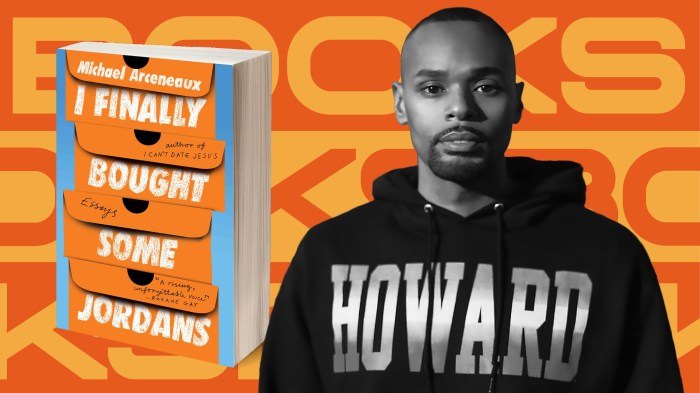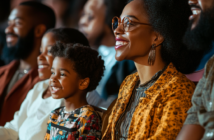Creating content in the midst of grief can profoundly impact what you produce. This is especially true for authors like Michael Arceneaux, who published his third book, I Finally Bought Some Jordans, while navigating the loss of friends and family and the devastating pain that came with it. As Arceneaux noted, “Grief sends your mind in a lot of different spaces.” These experiences also made him question how people would receive this book.
“I was really concerned that I missed the mark, that this book wasn’t up to the standard that I wanted to set because I was writing it under so much duress and while I was in so much pain,” Arceneaux told Andscape. “Some people feel like this is one of my best books, and some of my greatest work. I appreciate that and it’s been really nice to hear that from people. That makes me feel good.”
Former NFL player R.K. Russell recounts what it was like to come out to his motherRead now
In I Finally Bought Some Jordans, Arceneaux covers a range of topics, such as finally having enough money to treat himself (hence the Jordans in the book’s title), writing about (and being blocked by) celebrities in the past, reconciling his relationship with family, his complicated feelings about money, and dealing with grief. In all, it’s a smart, candid, and heartfelt book that invites readers to explore the many facets of Arceneaux’s world. From his razor-sharp political analysis to the layered stories about his parents, The New York Times bestselling author once again pushes readers to think deeper about family, pop culture, politics, and the relatable journey to more economic stability.
Andscape caught up with Arceneaux to talk about his work, grief, and what he hopes we all take away from his latest book.
This interview has been edited for length and clarity.
You captured serious historical moments in this book while still being your witty and hilarious self. For example, you wrote about [former Florida gubernatorial Democratic nominee]Andrew Gilliam with great nuance in one chapter, and then in another, you talked about your displeasure for [performing oral sex]. So what exactly was the mark for this book and what was your standard?
The book is very different from what I originally intended, but I was carrying so much grief while I was writing it. I lost one friend to suicide. I had another friend with brain cancer — all of these things were happening and then the pandemic hit and I was in Harlem. When I finally got into a space where I could refocus and shape the book the way I wanted to, my mom was diagnosed with cancer. I was finishing the book and rewriting things during that period, and I needed to make sure that my writing pursuits never got in the way of spending time with my mother. Spending time with my mom was my priority, but my mom was pushing me to finish and really focus on the book and on my work. So while I was writing the book, I had to be really honest about where I was at. I took the pressure off myself to be funny, which ultimately made the book what it was supposed to be, and not necessarily what I planned on it being.
Taking pressure off yourself can be hard enough, factor in grieving on multiple levels while finishing a book, and it just sounds brutal. How did you navigate all of this?
I needed to lean into some of the things my mom taught me. My mama has always stressed the importance of doing your work, being responsible, and having a strong work ethic, so I had to lean into that principle and actually practice a lot of discipline to write the book and to really be honest about where I was, which was not in a place where I felt like being especially funny.
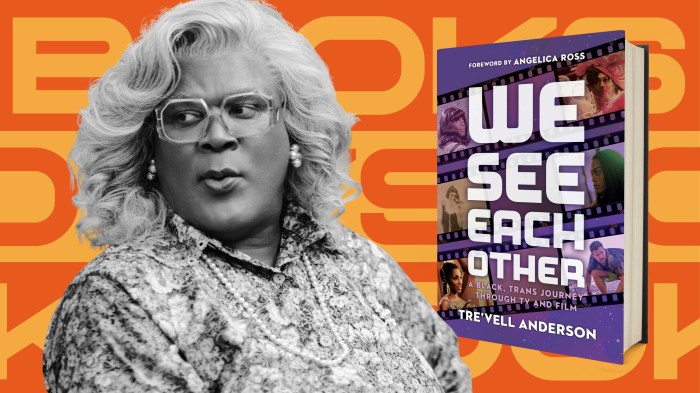 From Flip Wilson to Madea, Black male comedians in dresses are a Hollywood rite of passageRead now
From Flip Wilson to Madea, Black male comedians in dresses are a Hollywood rite of passageRead now
Working while grieving can often look like showing up at book events and conducting interviews during days that are especially emotional. How are you managing this?
The love people show me during the events has really affirmed me. I’ve also enjoyed going back to bookstores — something I didn’t get to do with my second book because it came out when the plague started, so everything was closed — and engaging with readers. There has been a lot of love in the room at every event. Even though it’s not the most ideal time, I’m fortunate that people understand my pain and have been giving me so much love.
Shortly after my book was released my grandmother and two of my mother’s sisters passed away. One of them helped my mom raise me. I quickly learned that I needed a pool of different coping mechanisms to help me get through each moment. Is there anything about the way you captured your mom, or the stories you shared about her, that gives you peace right now?
My aunt texted me one day and reminded me about one particular chapter. I was in Texas during that freeze when the electrical grid failed. I was there with no water and power in an Airbnb I was renting to be close to my mom. [During the freeze] I felt trapped at the Airbnb. My [cellphone]battery was dying and there was no electricity. I was in the Airbnb for about two days and my mom hadn’t heard from me. One day I heard bangs on the door while I was trying to use the bathroom with no water. It was my mom with a flashlight saying get up, we’re leaving. She said she came to get her baby. Her power came back on the night before. She was not going to let her son freeze. That chapter is a reminder of just who she was because that’s quintessential my mom. No matter what age we are, my mom will do whatever for her kids and her grandkids. She was driving down powerless streets with a big flashlight looking for her baby. That story gives me comfort and it’s a reminder that my mom really loved us.
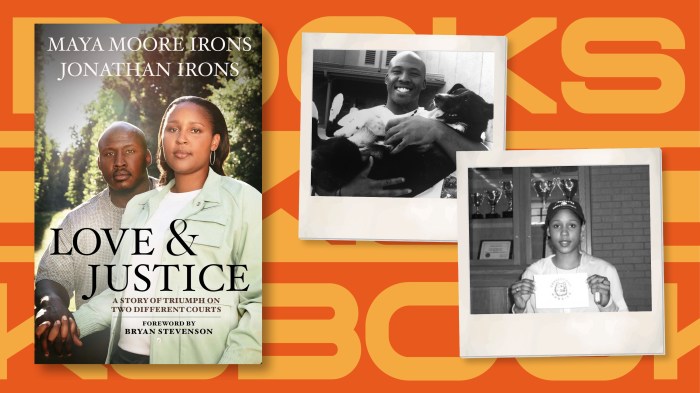 WNBA star Maya Moore recalls when her relationship with a prisoner changed from friendship to loveRead now
WNBA star Maya Moore recalls when her relationship with a prisoner changed from friendship to loveRead now
You did a great job of capturing the love your mom had for you. You also did a great job of capturing the nuance of what it’s like to have a complicated relationship with a parent, and for you, it’s your dad. What helped you grow to the place where you can recognize his unorthodox ways as a form of love?
It’s funny because he actually says ‘l love you’ now. But I had to learn that you have to meet people where they are. Sometimes in your own healing, you may not get the outcome you desire, but you can reach an outcome that may give you peace, or something close to it. For me, I had to learn to really understand who my father was and how he became this person. This helped me to let go of a lot of anger I had towards him. This allowed me to see my father’s growth. If you really want to break a cycle, you have to figure out what peace can look like.
I know many of the deeply personal stories were shaped by your grief, but how did you decide which stories from pop culture and politics to incorporate in the book?
Some of the essays came from topics I didn’t get to revisit in some of my online writing, so I wanted to revisit it in this book. I also wanted the stories to come from a real perspective on what was happening at the time [for example, with the coronavirus pandemic]. Some things I didn’t even mean to come off as super-political, like my essay around my disdain for the mistreatment of service workers or the way politicians talk down to working-class Black folks. But I was concerned about whether or not some of the events that happened in 2020 would still apply.
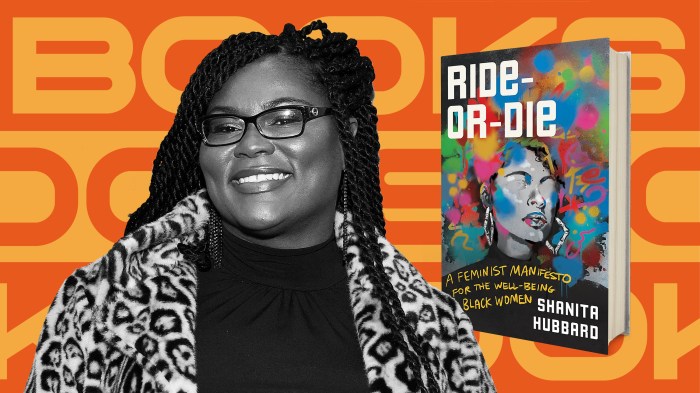 Why Shanita Hubbard wants ‘ride or die’ women to be freeRead now
Why Shanita Hubbard wants ‘ride or die’ women to be freeRead now
It is very relatable to experience long periods of economic hardships and then finally get to a place where you can breathe financially. Several years ago, my car was repossessed, and when I hear a large truck slowing down near my house, my heart jumps a little. Do you ever still have similar moments?
Yes, I still have those moments. I still have to remind myself that I deserve nice things no matter what I want. Yes, I do have my PTSD, but I’ve gotten better.
After reading I Finally Bought Some Jordans, is there one thing you want readers to sit with?
Usually, I have simple goals. I want people to laugh. I want people to think. Other than that, I hope people feel less alone with this book because a lot of people want to forget that 2020 even happened. And I want to remind people that if you’re able, call your mom.
Shanita Hubbard is a writer, adjunct sociologist, sorors fellow and author of the upcoming book Miseducation: A Woman’s Guide To Hip-Hop.
